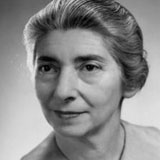Biography: Dr. Grete Lehner Bibring

Grete Lehner became fascinated with Sigmund Freud's work in psychoanalysis and entered the University of Vienna in 1918 as one of only a handful of women medical students. She soon became convinced of the need to incorporate psychoanalytic techniques into the practice of medicine, a belief that would permeate her later work.
According to a colleague, "Grete L. Bibring was a doyenne of the Boston psychiatric community." She was appointed chief of psychiatry at Boston's Beth Israel Hospital in 1946 and in 1961 she became one of only a few woman physicians appointed to a full professorship at Harvard Medical School at the time.
Born into a non-practicing Jewish family in Vienna, Austria in 1899, Grete Lehner became fascinated with Sigmund Freud's work in psychoanalysis and entered the University of Vienna in 1918 as one of only a handful of women medical students. She soon became convinced of the need to incorporate psychoanalytic techniques into the practice of medicine, a belief that would permeate her later work. She married Edward Bibring, a fellow member of Freud's Vienna Pschoanalytic Society, in 1922, and the pair established a lifelong collaborative partnership as key members of the "second generation" of psychoanalysts who established the fundamental role of psychoanalytic concepts in the theory and practice of psychiatry.
Leaving Austria for London, traveling with Freud, after the Nazi takeover in 1938, Bibring and her family soon settled in Boston, where she enjoyed a prolific and influential career in medicine until her death in 1977. She served as president of the Boston Psychoanalytic Society and Institute, president of the American Psychoanalytic Association, and vice president of the International Psycho-Analytical Association.
A dedicated and enthusiastic teacher, Dr. Grete Bibring had a gift for conveying complex concepts in clear and understandable terms. She championed the idea that successful medical care requires a physician to understand a patient's personality and psychological needs, and published widely in the psychiatric field. Bibring also consistently strove to focus attention on women's health issues, conducting groundbreaking research on the psychological effects of pregnancy.
In 1995, on the fiftieth anniversary of their acceptance of women medical students, Harvard Medical School recognized Bibring's unique contributions to the American psychoanalytic community by naming a conference room in her honor.






